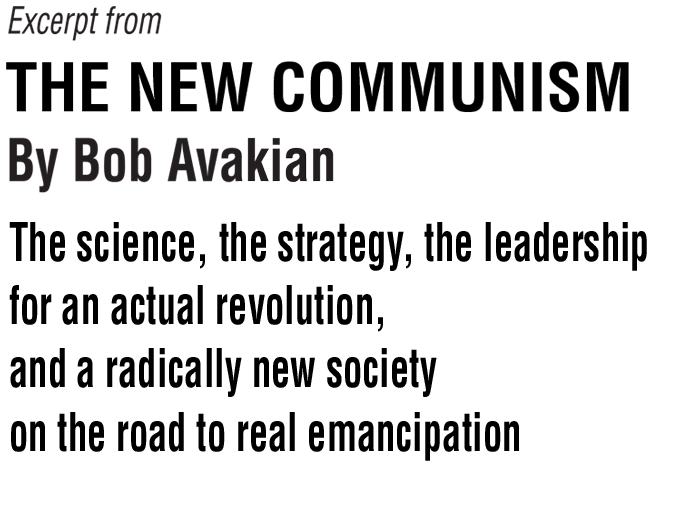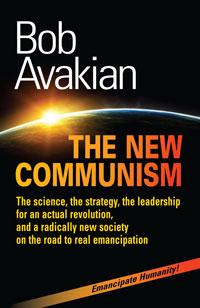
The following is an excerpt from the work by Bob Avakian, The New Communism. In addition to this and other excerpts posted on revcom.us, we will be running further excerpts from time to time on revcom.us. These excerpts should serve as encouragement and inspiration for people to get into the work as a whole, which is available as a book from Insight Press and as a PDF online at revcom.us.


This excerpt comes from the section titled "IV. The Leadership We Need."
This raises another point I spoke about at the beginning of this Cultural Revolution in the RCP. And that is the phenomenon that, as I put it then, most of the time, most communists are not communists. Now, this is obviously a problem! So, what do I mean by that? I mean that people, even people who sincerely consider themselves and want to be communists, are influenced strongly by all the pulls of living in a world which obviously is not communist and is powerfully pushing things in the opposite direction, in terms of how the system operates, the ways of thinking it promotes, and the influence of all that on people. And it seems that communists, living in this world of bourgeois relations, have many times found it very difficult, in their own thinking, to get beyond the realm of bourgeois right; to get beyond thinking that all we need to do, or the most important thing we need to do, is improve democracy; to get beyond thinking that we just need to have more equality; to get beyond thinking that, for example in a country like China (and this was a major theme of the revisionists there), since China for centuries has been trampled on by all these other powers in the world, what is needed, and what should be the basic goal, is to build China up as a powerful country so that it can take its rightful place in the world—which then strongly influences things to go on the road of capitalism, because that seems to be a kind of “shortcut” to building up the country as a power to contend with all the other powerful countries in the world—and this takes the place of thinking about the whole world and how to move beyond oppression and exploitation for the masses of people in the whole world. You see, another form of bourgeois right is just thinking in terms of “my nation, my people, my country” in opposition, at least objectively, to every other nation, people and country. Where does my nation, where does my people, where does my country stand in relation to everybody else? It becomes a contest of commodity relations on the level of nation to nation, or people to people, or country to country.
A lot of communists have had a very hard time getting beyond that whole way of thinking and instead approaching things with the orientation: yes, we make revolution in particular countries; yes, we have to struggle against the inequalities that are embedded in this system, within and between nations and countries; but the goal is way beyond that. The goal is to get to a radically different world where we have moved beyond all the things that constantly give rise to inequality and oppression and exploitation, all the things that are concentrated in that formulation of the “4 Alls.” A lot of communists—or people who call themselves communists—have forgotten about the “4 Alls.” They just concern themselves with the immediate struggle and what they can do to improve things here and there within the given framework, particularly the framework of the particular country they’re in. I’ve referred a number of times to the polemic in Demarcations #4, “Ajith—A Portrait of the Residue of the Past.” I’ve also referred to another important polemic against Ajith, by the OCR of Mexico, Communism or Nationalism? which is also in Demarcations #4. These polemics go deeply into the difference between actually being a communist and working toward the “4 Alls,” on the one hand, and working for something less, even in the name of communism, on the other hand.
What all this points to is the need for a continuing struggle for communists to actually be communists, to be guided by what communism is really about: the application of the scientific method and approach of communism, aiming for the goal of what’s concentrated in the “4 Alls,” all over the world, and not looking at things in terms of something more short-term, more narrow and limited. In other words, communists, too, have to continually struggle to break themselves out of the confines, beyond the narrow horizon, of bourgeois right, in terms of their basic orientation and approach. This struggle is ongoing, and will be ongoing, because this is not happening in a vacuum—it is happening in a world where bourgeois relations and bourgeois right are constantly asserting their influence on people, in the way this system works and the way it conditions and propagandizes people to think and act.
Contents
Publisher's Note
Introduction and Orientation
Foolish Victims of Deceit, and Self-Deceit
Part I. Method and Approach, Communism as a Science
Materialism vs. Idealism
Dialectical Materialism
Through Which Mode of Production
The Basic Contradictions and Dynamics of Capitalism
The New Synthesis of Communism
The Basis for Revolution
Epistemology and Morality, Objective Truth and Relativist Nonsense
Self and a “Consumerist” Approach to Ideas
What Is Your Life Going to Be About?—Raising People’s SightsPart II. Socialism and the Advance to Communism:
A Radically Different Way the World Could Be, A Road to Real EmancipationThe “4 Alls”
Beyond the Narrow Horizon of Bourgeois Right
Socialism as an Economic System and a Political System—And a Transition to Communism
Internationalism
Abundance, Revolution, and the Advance to Communism—A Dialectical Materialist Understanding
The Importance of the “Parachute Point”—Even Now, and Even More With An Actual Revolution
The Constitution for the New Socialist Republic in North America—
Solid Core with a Lot of Elasticity on the Basis of the Solid Core
Emancipators of HumanityPart III. The Strategic Approach to An Actual Revolution
One Overall Strategic Approach
Hastening While Awaiting
Forces For Revolution
Separation of the Communist Movement from the Labor Movement, Driving Forces for Revolution
National Liberation and Proletarian Revolution
The Strategic Importance of the Struggle for the Emancipation of Women
The United Front under the Leadership of the Proletariat
Youth, Students and the Intelligentsia
Struggling Against Petit Bourgeois Modes of Thinking, While Maintaining the Correct Strategic Orientation
The “Two Maximizings”
The “5 Stops”
The Two Mainstays
Returning to "On the Possibility of Revolution"
Internationalism—Revolutionary Defeatism
Internationalism and an International Dimension
Internationalism—Bringing Forward Another Way
Popularizing the Strategy
Fundamental OrientationPart IV. The Leadership We Need
The Decisive Role of Leadership
A Leading Core of Intellectuals—and the Contradictions Bound Up with This
Another Kind of “Pyramid”
The Cultural Revolution Within the RCP
The Need for Communists to Be Communists
A Fundamentally Antagonistic Relation—and the Crucial Implications of That
Strengthening the Party—Qualitatively as well as Quantitatively
Forms of Revolutionary Organization, and the “Ohio”
Statesmen, and Strategic Commanders
Methods of Leadership, the Science and the “Art” of Leadership
Working Back from “On the Possibility”—
Another Application of “Solid Core with a Lot of Elasticity on the Basis of the Solid Core”Appendix 1:
The New Synthesis of Communism:
Fundamental Orientation, Method and Approach,
and Core Elements—An Outline
by Bob AvakianAppendix 2:
Framework and Guidelines for Study and DiscussionNotes
Selected List of Works Cited
About the Author